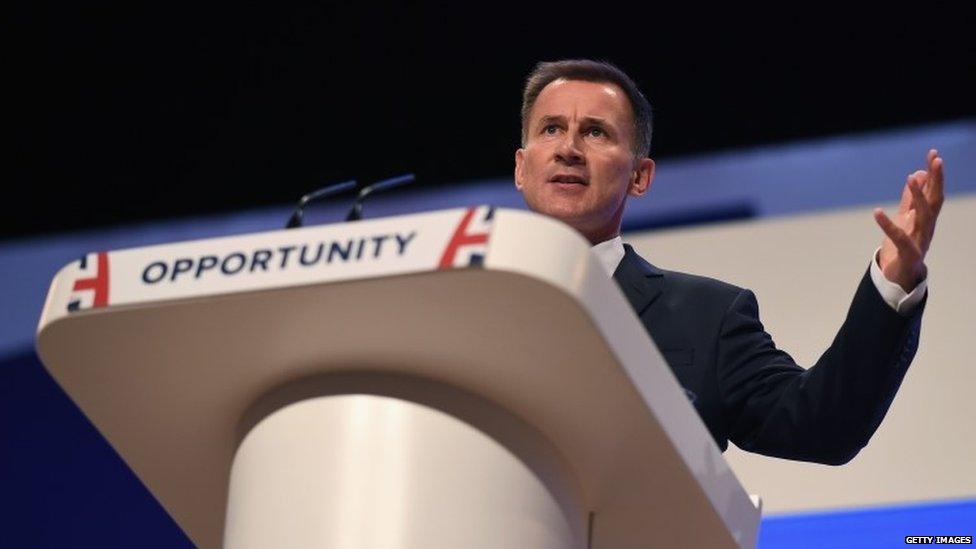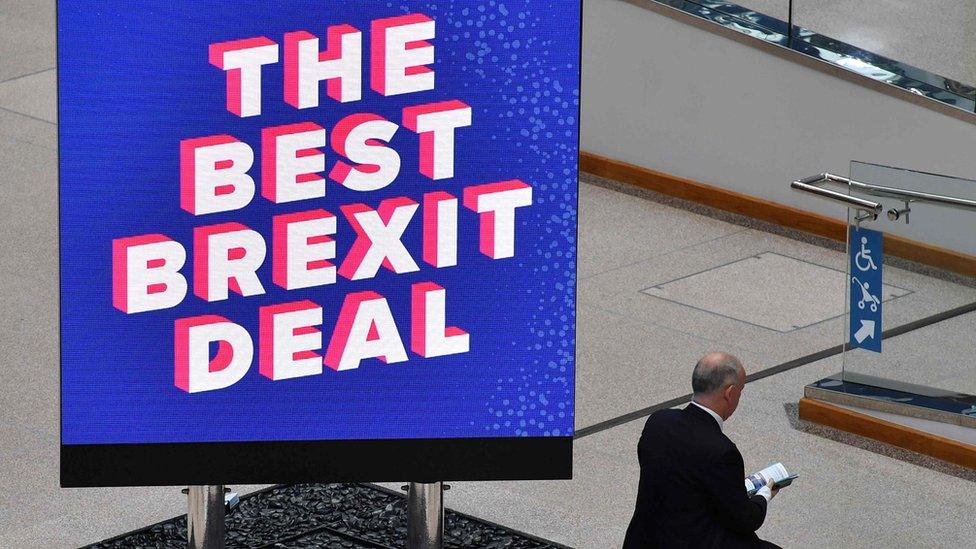Brexit: EU figures demand Jeremy Hunt apologise for Soviet comparison
- Published

Senior Europeans have called on Foreign Secretary Jeremy Hunt to apologise for likening the EU to the Soviet Union.
Mr Hunt's comment, during his Tory conference speech, was about efforts to stop members leaving the bloc.
Brexit coordinator Guy Verhofstadt was among MEPs calling for an apology. Some described the comments as "a new level of populism" and far-right language.
Mr Hunt said he was pointing out the EU negotiators' approach was not consistent with European values.
Three serving EU ambassadors to London publicly criticised the foreign secretary on Monday, saying the comparison was both wrong and insulting to those who had lived through years of Soviet rule.
But UKIP leader Nigel Farage said Mr Hunt was "using my language".
Relations between the UK and the EU were already on edge after European leaders publicly criticised Theresa May's plan for future co-operation after Brexit at a summit in Austria last month.
British ministers had accused the EU of not showing the UK due respect after the PM's plans were mocked on social media during the Salzburg meeting.
Then, on Sunday, Mr Hunt provoked a diplomatic row after accusing the EU of seeking to punish the UK in order to "keep the club together".
His speech recalled a visit to Latvia earlier this summer and the role that the UK and others played in helping it transition from Soviet rule to becoming a modern democracy and market economy.
"What happened to the confidence and ideals of the European dream?" he asked. "The EU was set up to protect freedom. It was the Soviet Union that stopped people leaving."
Allow X content?
This article contains content provided by X. We ask for your permission before anything is loaded, as they may be using cookies and other technologies. You may want to read X’s cookie policy, external and privacy policy, external before accepting. To view this content choose ‘accept and continue’.
In response, Baiba Braze, the Latvian ambassador to the UK, said the comparison was misguided as the Soviets "killed, deported, exiled and imprisoned hundreds of thousands of Latvia's inhabitants after the illegal occupation in 1940, and ruined lives of three generations, while the EU has brought prosperity, equality, growth, respect".
Her Estonian counterpart, Tiina Intelmann, joined in the criticism, tweeting:

Allow X content?
This article contains content provided by X. We ask for your permission before anything is loaded, as they may be using cookies and other technologies. You may want to read X’s cookie policy, external and privacy policy, external before accepting. To view this content choose ‘accept and continue’.
The Swedish ambassador Torbjorn Sohlstrom said the UK rightly deserved respect but the comments were wide of the mark.
The remarks have also raised eyebrows among former senior British diplomats.
Lord Ricketts, who led the Foreign Office between 2006 and 2010, said the only punishment that the UK would suffer from Brexit was "self-inflicted".
"This rubbish is unworthy of a British foreign secretary," he said. "The EU isn't a Soviet-style prison. Its legal order has brought peace and prosperity after a century of war."
And his successor, Sir Simon Fraser, suggested it was a "shocking failure of judgement" by Mr Hunt, who succeeded Boris Johnson in the role in July.
A European Commission spokesman added: "I would say respectfully that we would all benefit - and in particular foreign affairs ministers - from opening a history book from time to time."
- Published1 October 2018
